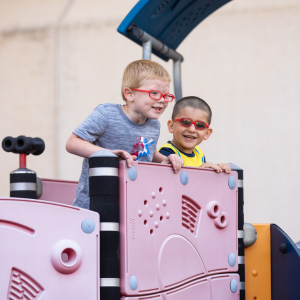All the Light We Cannot See: Bringing Authenticity to the Portrayal of Blindness
By Beth Walker • Nov 16, 2023
.png?lang=en-US&ext=.png)
Blog Content
Aria Loberti, who plays the older version of Marie, shared in an article with Vanity Fair (which was done before the SAG-AFTRA strike), “I just kept going on tape and meeting with people, and I was just happy doing that,” and that at the time, she thought, “I like acting. It makes me feel good. Too bad it can’t be a career. They’re gonna go hire a sighted girl.” While this is sad to hear, it is often the reality of people who have disabilities.
The public perception of blindness is slowly improving, but it can only do so when people who are blind or visually impaired are able to be in positions of influence and are encouraged to do so, not diminished or misunderstood. Loberti is the first actor who is blind that has been the lead or has had a large role in a Hollywood production at the scale of All the Light We Cannot See. This proves that there is still a dire need for better representation and opportunities for people with disabilities.
How All the Light We Cannot See accurately depicts blindness:
- Both actors that play the young and older versions of Marie have visual impairments, and the casting call for the role was specific to blind or visually impaired actors.
- The Director and Executive Producer Shawn Levy explained that his decision to cast the role of Marie to someone who is blind or visually impaired was not only a “creative decision, but a moral one as well,” going on to say that nothing could be more efficient and better to the story of the show than being truly authentic in casting decisions from the beginning.
- Marie (played by Loberti) does not act with the common misconceptions of blindness, as she looks people in the eye when she speaks, walks with confidence, and uses her hands and other senses to help her determine what’s happening around her.
- Marie shows she is capable and independent when she tells Werner that the intruder is about halfway down the staircase, as she has memorized the specific sound of each step.
- Breaking the stigma of pity that being blind is “brave” when Marie says to Werner, “When I lost my sight, people said I was brave. When my father left, people said I was brave. But it is not bravery; I have no choice. I wake up and live my life. Don’t you do the same?”
- Marie recognizing the sound of Nazi boots and learning to “disguise her blindness” so she would not be attacked for being different (which shows that she is smart and able to use other senses at her disposal, as many people who are blind do).
- When papers flood the room from the United States informing that they are going to bomb Germany, Marie picks up a paper and smells it, hinting that she picks up on it being fresh ink that was recently printed, so she knows what it means and where it has come from, regardless of the fact that she cannot see to read it.
- The Associate Producer of the show, Joe Stretchay, is blind and worked closely with Shawn Levy to ensure that certain scenes in the show were accurate to the representation of people who are blind; such as pointing out that Maria probably didn’t need to be shown grabbing her cane in her own home to get from the living room to the bed, as most intimate spaces are familiar to people who are blind and they don’t need assistance.
As an organization whose mission is to improve the quality of life and provide inspiration and opportunity for people who are blind or visually impaired, we are passionate about breaking down stigmas and the misconceptions that exist around vision loss. If you are interested in learning more about our mission, please contact us at
info@envisionus.com or visit www.envisionus.com.
